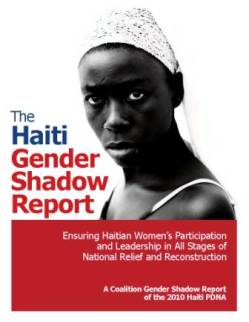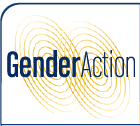|
Haiti Gender Shadow Report: Ensuring Haitian Women's Participation and Leadership in All Stages of National Relief and Reconstruction
 Haiti Equality Collective
Haiti Equality Collective
2010
Download the full pdf version.
Executive Summary
Following the devastating January 12, 2010 earthquake, Haiti's government, supported by the World Bank, led an ambitious Post-Disaster Needs Assessment (PDNA)-an operative blueprint for reconstruction. Astonishingly, the PDNA failed to address gender issues. This Gender Shadow report (GSR) provides the missing gender content for PDNA policymakers, donors, civil society groups and all stakeholders involved in Haiti's reconstruction. It follows a parallel outline to the PDNA by presenting issues related to governance and accountability, environment and disaster risk reduction, social sectors, infrastructure, the economy and cross-cutting themes.
Written by women from diverse backgrounds working both in grassroots communities in Haiti and in the international arena, the GSR offers stakeholders a set of human rights-based gender interventions to round out current redevelopment efforts and achieve greater inclusion and success.
The motivation of this GSR is the imperative for women's full participation and leadership in all phases of the reconstruction of Haiti, as mandated by UN Security Council Resolution 1325 and other internationally recognized standards that were reprioritized at a recent Millennium Development Goal summit. These standards require that a gender perspective be integrated into ongoing post-disaster and reconstruction planning at every stage: assessment, planning, implementation, monitoring and evaluation. Overcoming gender discrimination requires implementing the legal policy architecture that upholds the full range of Haitian women's human rights, including social and economic rights. Women's political and community leadership and care-giving work must be recognized and supported by policy and program mandates, as well as by resource commitments, that enable women to play meaningful, sustained and formal roles in the recovery process. Ultimately, this is the only way to rebuild Haiti on a more equitable and disaster-resilient foundation.
The remainder of this Executive Summary presents key recommendations to address gender issues in Haiti's reconstruction.
Key recommendations for policymakers, donors, civil society groups and all PDNA stakeholders:
I. Methodically require consultation with women and women's groups in every post-disaster reconstruction project and all disaster preparedness planning.
II. Immediately strengthen IDP camp security, shelters and services by targeting gender-based violence, malnutrition and disease.
III. Implement and enforce gender equity and anti-discrimination laws, in particularly against sexual violence, sexual harassment and human trafficking.
IV. Create a National Redevelopment Gender Advisory Task Force comprised of government officials from disparate ministries, civil society members and grassroots groups.
- Standardize gender mainstreaming across all public planning through system-wide gender disaggregated data.
- Require that every new financial pledge integrate gender equity indicators.
-
Commit to transparency through the public dissemination of materials.
V. Clarify women's unique post-disaster vulnerabilities and integrate them into infrastructure reconstruction, environmental strategies and national economic planning. -
Target the security, economic and social needs of women as heads of households, income generators and caretakers when designing projects aimed at rebuilding
national infrastructure.
-
Identify, quantify and compensate economic losses where women are especially vulnerable in all housing, land use and construction planning.
-
Develop a road grid and transportation sector that prioritizes the security, livelihood and household responsibility needs of women and girls.
-
Monitor and support women-owned businesses.
VI. Create a health system that prioritizes the sexual and reproductive needs of women and their roles as care-takers for children, the elderly and disabled people. -
Support the establishment of community-based family wellness centers and include men in family planning discussions.
-
Strengthen linkages that address the vulnerabilities of women and children to sexual trafficking, sexual violence and the contraction of sexual transmitted diseases.
-
Increase investment in HIV/ AIDS prevention and awareness.
-
Prioritize mental health services and services to disabled people.
VII. Transition to a national education system that provides free primary education and protects children from domestic servitude and illegal labor practices. -
Isolate and address factors preventing females from equitable education, such as poverty, forced or voluntary prostitution, violence and sexual abuse, teenage pregnancy, early marriage, household responsibilities, and inadequate hygiene supplies.
-
Prioritize the educational needs of street children by providing mobile libraries, health and sexual education, recreational events and parent trainings.
|
